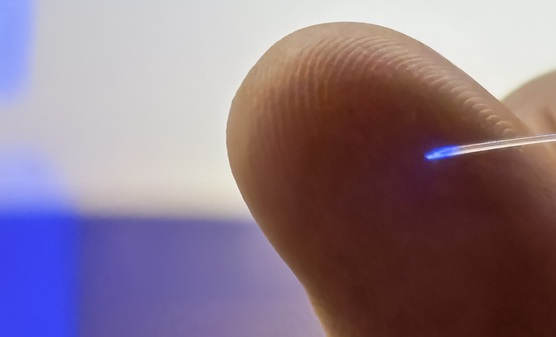Columbia Asia to Expand Hospital Network
|
By HospiMedica International staff writers Posted on 22 Sep 2014 |

Image: The Columbia Asia hospital in Kolkata (India) (Photo courtesy of Columbia Asia).
Columbia Asia (Selangor, Malaysia), part of Columbia Pacific Management (Seattle, WA, USA), plans to invest around USD 150 million to expand its hospital network in India and South-East Asia.
Currently, Columbia Asia manages 26 hospitals and one clinic in Malaysia, India, Indonesia, and Vietnam, which provide services to around two million patients per year. The company intends to increase its network to 34 hospitals and one clinic by 2018. Just in the last few months, Columbia Asia has launched four new hospitals in Jakarta and Semarang (Indonesia), as well as Bangalore and Ahmedabad, in India. The hospital system also manages five hospitals in Kuala Lumpur (Malaysia), and is planning to open a sixth one in 2016 and a seventh in 2017.
“When we began opening hospitals, virtually all of the care was paid for directly by the patients, but in countries like Malaysia, our hospitals have benefitted from the rapid growth of health insurance to a point where today nearly 70% of our patients have coverage,” said Nate McLemore, managing director of Columbia Pacific Management. “It is a major shift, and by focusing on delivering value through high-quality care at affordable prices we are uniquely positioned to serve this newly insured population.”
Each Columbia Asia medical facility houses no more than 100 beds per hospital, with the concept behind the simplicity oriented towards future healthcare trends - efficiency, accessibility, and cost-effectiveness. The model allows Columbia Asia to offers affordable medical services through community hospitals and clinics located in residential areas, making private healthcare more accessible and efficient for patients. Moreover, rate structures are transparent and comparatively lower than the standard model for private healthcare.
Related Links:
Columbia Asia
Columbia Pacific Management
Currently, Columbia Asia manages 26 hospitals and one clinic in Malaysia, India, Indonesia, and Vietnam, which provide services to around two million patients per year. The company intends to increase its network to 34 hospitals and one clinic by 2018. Just in the last few months, Columbia Asia has launched four new hospitals in Jakarta and Semarang (Indonesia), as well as Bangalore and Ahmedabad, in India. The hospital system also manages five hospitals in Kuala Lumpur (Malaysia), and is planning to open a sixth one in 2016 and a seventh in 2017.
“When we began opening hospitals, virtually all of the care was paid for directly by the patients, but in countries like Malaysia, our hospitals have benefitted from the rapid growth of health insurance to a point where today nearly 70% of our patients have coverage,” said Nate McLemore, managing director of Columbia Pacific Management. “It is a major shift, and by focusing on delivering value through high-quality care at affordable prices we are uniquely positioned to serve this newly insured population.”
Each Columbia Asia medical facility houses no more than 100 beds per hospital, with the concept behind the simplicity oriented towards future healthcare trends - efficiency, accessibility, and cost-effectiveness. The model allows Columbia Asia to offers affordable medical services through community hospitals and clinics located in residential areas, making private healthcare more accessible and efficient for patients. Moreover, rate structures are transparent and comparatively lower than the standard model for private healthcare.
Related Links:
Columbia Asia
Columbia Pacific Management
Latest Hospital News News
- Nurse Tracking System Improves Hospital Workflow
- New Children’s Hospital Transforms California Healthcare
- Noisy Hospitals Face Threat of Decreased Federal Compensation
- Orthopedics Centre of Excellence Planned for Guy’s Hospital
- Research Suggests Avoidance of Low-Value Surgical Procedures
- U.S. Federal Readmission Fines Linked to Higher Mortality
- Columbia China to Build New Hospital in Jiaxing
- Dubai Debuts Second Robotic Pharmacy Service
- Seattle Hospital Network Shifts Away from Overlapping Surgeries
- ACC to Launch Valvular Heart Disease Program in China
- Mortality Rates Lower at Major Teaching Hospitals
- South Australia to Inaugurate Upscale Hospital
- Raffles to Launch Second Hospital Project in China
- Research Center Tackles Antimicrobial Drugs Challenge
- Miami Cardiac & Vascular Institute Completes Expansion Project
- Hospital Antibiotic Policies Improve Prescription Practices
Channels
Artificial Intelligence
view channelCritical Care
view channel
Specialized Dressing with Sensor Monitors pH Levels in Chronic Wounds
Any wound has the potential to become chronic, but the risk is significantly higher in individuals with certain medical conditions. Once a wound becomes chronic, healing slows, complications increase,... Read more
AI Model Could Help Diagnose Spinal Cord Disease Up To 30 Months Earlier
Cervical spondylotic myelopathy (CSM) is the leading cause of spinal cord dysfunction in older adults and occurs when arthritis in the neck compresses the spinal cord. The condition is chronic and progressive,... Read moreSurgical Techniques
view channel
Brain Implant Records Neural Signals and Delivers Precise Medication
Neurological diseases such as epilepsy involve complex interactions across multiple layers of the brain, yet current implants can typically stimulate or record activity from only a single point.... Read moreAI-Based OCT Image Analysis Identifies High-Risk Plaques in Coronary Arteries
Lipid-rich plaques inside coronary arteries are strongly associated with heart attacks and other major cardiac events. While optical coherence tomography (OCT) provides detailed images of vessel structure... Read moreNeural Device Regrows Surrounding Skull After Brain Implantation
Placing electronic implants on the brain typically requires removing a portion of the skull, creating challenges for long-term access and safe closure. Current methods often involve temporarily replacing the skull or securing metal plates, which can lead to complications such as skin erosion and additional surgeries.... Read morePatient Care
view channel
Revolutionary Automatic IV-Line Flushing Device to Enhance Infusion Care
More than 80% of in-hospital patients receive intravenous (IV) therapy. Every dose of IV medicine delivered in a small volume (<250 mL) infusion bag should be followed by subsequent flushing to ensure... Read more
VR Training Tool Combats Contamination of Portable Medical Equipment
Healthcare-associated infections (HAIs) impact one in every 31 patients, cause nearly 100,000 deaths each year, and cost USD 28.4 billion in direct medical expenses. Notably, up to 75% of these infections... Read more
Portable Biosensor Platform to Reduce Hospital-Acquired Infections
Approximately 4 million patients in the European Union acquire healthcare-associated infections (HAIs) or nosocomial infections each year, with around 37,000 deaths directly resulting from these infections,... Read moreFirst-Of-Its-Kind Portable Germicidal Light Technology Disinfects High-Touch Clinical Surfaces in Seconds
Reducing healthcare-acquired infections (HAIs) remains a pressing issue within global healthcare systems. In the United States alone, 1.7 million patients contract HAIs annually, leading to approximately... Read moreHealth IT
view channel
EMR-Based Tool Predicts Graft Failure After Kidney Transplant
Kidney transplantation offers patients with end-stage kidney disease longer survival and better quality of life than dialysis, yet graft failure remains a major challenge. Although a successful transplant... Read more
Printable Molecule-Selective Nanoparticles Enable Mass Production of Wearable Biosensors
The future of medicine is likely to focus on the personalization of healthcare—understanding exactly what an individual requires and delivering the appropriate combination of nutrients, metabolites, and... Read moreBusiness
view channel
Medtronic to Acquire Coronary Artery Medtech Company CathWorks
Medtronic plc (Galway, Ireland) has announced that it will exercise its option to acquire CathWorks (Kfar Saba, Israel), a privately held medical device company, which aims to transform how coronary artery... Read more
Medtronic and Mindray Expand Strategic Partnership to Ambulatory Surgery Centers in the U.S.
Mindray North America and Medtronic have expanded their strategic partnership to bring integrated patient monitoring solutions to ambulatory surgery centers across the United States. The collaboration... Read more
FDA Clearance Expands Robotic Options for Minimally Invasive Heart Surgery
Cardiovascular disease remains the world’s leading cause of death, with nearly 18 million fatalities each year, and more than two million patients undergo open-heart surgery annually, most involving sternotomy.... Read more

















